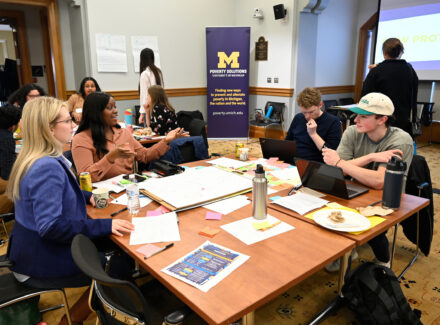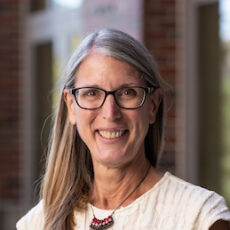46
Students assisted with Poverty Solutions research projects during the academic year 2022-23.
Poverty Solutions engages and empowers students interested in poverty alleviation and economic mobility through hands-on research, events, and academic programs and courses.
46
Students assisted with Poverty Solutions research projects during the academic year 2022-23.
We are committed to engaging students and the campus community to extend learning beyond the classroom. Our action-based research assistant opportunities, academic programs, student workshops, and events aim to deepen students’ understanding of the root causes of poverty, offer real world experience, and further ignite their dedication to pursue solutions to the poverty challenges of our time.
Engaging students, in turn, brings new insight, knowledge, and opinions to our work; enhances our interdisciplinary and collaborative approach; lends support and capacity to our projects and activities; and helps to promote campus-wide engagement.

Want to learn more? Hear from Poverty Solutions’ alumni speak about their experience – what they worked on while at Poverty Solutions, what skills they took with them, and where they are now.

Poverty Solutions offers the gateway course Real-World Perspectives on Poverty Solutions (SWK 503 section 001), which is open to all students. This course features national and global leaders and aims to ignite new conversations and deepen existing commitments regarding poverty prevention and alleviation strategies and programs.
The one-credit course explores interdisciplinary, real-world poverty solutions from a wide variety of perspectives and encourages the formation of a community of learners at U-M committed to engaging these issues together. This lecture series course features different guest speakers each week. Lectures will be recorded and made available online to engage the community regarding strategies and programs for poverty prevention and alleviation. Lectures will be free and available to the community as space permits.
“This has been the most inspiring class I’ve taken at the university and has been something I looked forward to every week. I hope the speaker series continues [next year!]” – Zoe Xuan Qin, MBA 2025
In partnership with the Community Action and Social Change (CASC) minor program, based at the School of Social Work, Poverty Solutions offers a certificate program. This certificate allows CASC students to focus on poverty alleviation and prevention within this social justice-focused, interdisciplinary minor. It also provides students with several opportunities to connect with Poverty Solutions through social events, research opportunities, and mentorship. Learn more.
The CASC minor, which currently has 250 undergraduate students enrolled each year, is flexibly designed for all undergraduate students to build skills and knowledge to enact social change.
Poverty Solutions Certificate Approved Courses
For students enrolled in the certificate program:
Log your volunteer hours (Google form)
Log your event attendance (Google form)
Poverty Solutions has several opportunities for students to contribute to action-based poverty research. Through research assistantships, students work alongside faculty and staff while gaining real-world experience and often contributing to policy change.
Research assistants contribute to data analysis, longitudinal research, literature reviews, data preparation, collection and analysis, event support and reporting. They engage with community partners, connect their learning and experience to our projects, and provide the capacity to take on many projects we couldn’t otherwise consider.
Research Assistant job listings will be posted here when available:
Sign up to receive email alerts about Poverty Solutions student job postings
There are several University of Michigan student organizations doing work related to alleviating poverty, including:
Have a suggestion for a student organization to add? Send us an email at povertysolutions@umich.edu.

Research assistant Ryan Ruggerio (MPP 2019) partnered with the Housing and Revitalization Department (HRD) at the city of Detroit to design and manage a research project focused on the status of home repair in Detroit, including evaluation of the city’s largest home repair program.

Poverty Solutions research assistants (RAs) are a crucial part of the team and the work Poverty Solutions does. Learn more about what a Poverty Solutions research assistantship is like.

More than 50 lawyers, policymakers, students, and coders from around the country convened over two days to tackle the pressing issue of debt collection and its impact on Michigan’s families and legal system at a workshop organized by Michigan Law student Malcolm Phelan.

Get the latest updates on course offerings, student events, and opportunities.

Student Engagement & Outreach Manager
734-615-0216 betrevor@umich.edu
Acting Faculty Director
734-615-2113 kseef@umich.edu